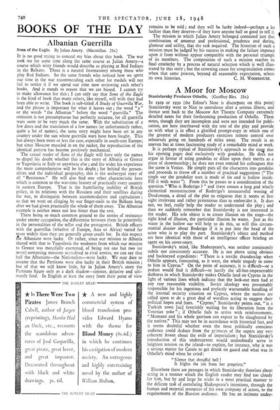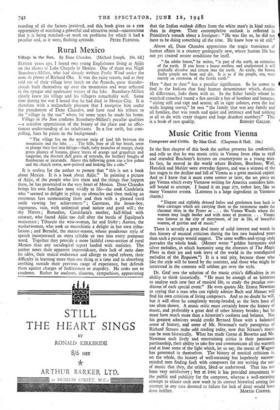A Moor for Moscow
Stanislaysky Produces Othello, (Geoffrey Bles. 21s.)
IN 1929 or 1930 (the Editor's Note is discrepant on this point) Stanislaysky went to Nice to convalesce after a serious illness, and thence sent back to the Moscow Art Theatre Company extremely detailed notes for their forthcoming production of Othello. These notes, though they are incomplete and were not intended for publi- cation, are here interleaved with the text of the play and provide us with what is in effect a glorified prompt-copy in which one of the greatest of modern producers exercises remote control over rehearsals going on hundreds of miles away. The result is an uneven but at times fascinating study of a remarkable mind at work.
It is perhaps typical of Stanislaysky's approach to the stage that his opening pages deal exclusively with gondolas. He does not argue in favour of using gondolas or dilate upon their merits as a piece of showmanship ; he does not even remind his colleagues that the scene is Venice. He simply puts all the characters into gondolas and proceeds to throw off a number of practical suggestions (" The single oar the gondolier uses is made of tin and is hollow inside. Fill it with water "). From this he passes to a consideration of the question " Who is Roderigo ? " and there ensues a long pnd wholly chimerical reconstruction of Roderigo's unsuccessful wooing of Desdemona, a detail of the plot so exiguous that it seems at first sight irrelevant and rather pretentious thus to embroider it. It does not, we feel, really' help the reader to understand the play ; and then we suddenly remember that Stanislaysky is not interested in the reader. His sole object is to create illusion on the stage—the right kind of illusion, the particular illusion he wants. Just as the water in the hollow oar will help to do this, so will this circum- stantial dossier about Roderigo if it is put into the head of the actor who is to play the part. Stanislaysky's object and method are here identical with those of an intelligence officer briefing an agent on his cover-story.
Stanislaysky's mind, like Shakespeare's, was neither consistently subtle nor consistently accurate. He is not above using obvious and hackneyed expedients: " There is a terrific thunderclap when Othello appears, forecasting, as it were, the whole tragedy to come to him in Cyprus." On the point of accuracy, it is difficult—or a pedant would find it difficult—to justify the all-but-impenetrable darkness in which Stanislaysky makes Othello land on Cyprus in the light of various lines which indicate that the look-out men had at any rate reasonable visibility. Soviet ideology was presumably responsible for his ingenious and perfectly warrantable handling of the internal security situation on Cyprus, where the natives are called upon to do a great deal of wordless acting to suggest their political hopes and fears. "Cyprus," Stanislaysky points out, "is a Turkish town [sic] feverishly waiting for its liberation from the Venetian yoke " ; if Othello fails to arrive with reinforcements, " Montano and his whole garrison can expect to be slaughtered by the natives." This may not be in accordance with historical fact, and it seems doubtful whether even the most politically conscious audience could deduce from the grimaces of the supers any very coherent lesson about the evils of imperialism ; but Stanislaysky's introduction of this undercurrent would undoubtedly serve to heighten tension on the island—to explain, for instance, why it was a serious matter for Cassio to get drunk on guard and what was in Othello's mind when he cried:
" Silence that dreadful bell I
It frights the isle from her propriety."
Elsewhere there are passages in which Stanislaysky theorises about acting in a manner which the English reader may find too cloudy for him, but by and large he sticks in a most practical manner to the delicate task of correlating Shakespeare's intentions, through the human and material resources of his own company of actors, to the requirements of the Russian audience. He has an intimate under- standing of all the factors involved, and this book gives us a rare opportunity of watching a pdwerful and attractive mind—unconscious that it is being watched—at work on problems for which it had a peculiar and, as it were, flashing aptitude. PETER FLEMING.



































 Previous page
Previous page